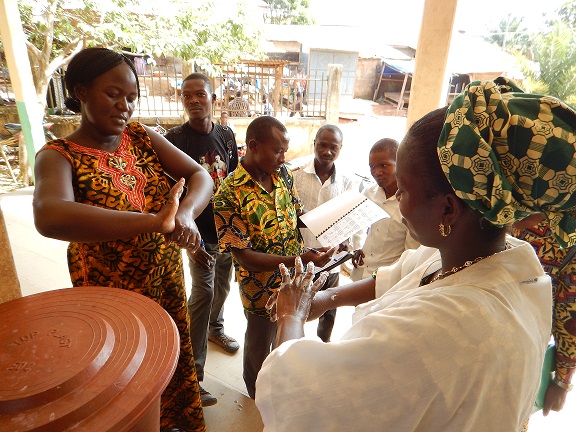
Health workers at a small clinic in N’Zérékoré. Credit: Lindsey Horton / CDC
Guinea is one of the poorest countries in Africa, with approximately 12 million inhabitants in 2013 and a Gross Domestic Product per capita of 523 US dollars. More than half the population lives below the poverty line and about 20 percent live in extreme poverty. The country ranks 178th of 187 countries classified by the United Nations Development Program Human Development Index.
Despite the progress made in the past decades, health outcomes remain poor compared to other countries in Africa, and the country suffers from a shortage of human resources for health, most of whom are concentrated in the capital. Around 60% of health workers are found in Conakry, which accounts for approximately 20% of the country’s population. Service utilization remains low due to financial barriers and the perception that quality is weak at all levels of the health system.
In this already fragile situation, the 2014 Ebola epidemic further weakened the health system. Guinea suffered enormous social and economic consequence as the disease caused thousands of deaths (including many frontline health workers) and drained significant resources. With its resources stretched thin, the health system is unable to adequately provide necessary services. Consequently, treatment for diseases such as measles, malaria, and cholera has been disrupted. The epidemic also exposed a genuine mistrust of the public health system in many areas as communities refused to be treated in public health facilities, fearing that medical professionals were the source of the illness.
Strengthening the Ebola-Weakened Health System
In response to these issues, the MOH developed the Plan de Relance 2015-2107 aimed at strengthening the health system to be better able to respond to Ebola and other crises. This plan, which is in effect for the first three years of the 2015-2024 National Health Development Plan, was developed in full coordination with national and international partners in response to the Ebola crisis and shapes the priorities of the MOH and partners. Addressing the weak performance of the health system and improving the country’s health status is one of the defined priorities and require tackling the root problem of poor health governance at all levels of the health system. HFG support will focus on governance and institutional strengthening of the MOH at the national level in order to build a more transparent and efficient health system.
Under the Ebola Recovery Strategy, the HFG activity is aimed at rebuilding the health system not only to improve capacity to provide better health services, but also to be able to better respond to crises. It is at times of crises that health systems are most stressed. Health systems that are resilient and have public trust will be better equipped to respond to health emergencies. The HFG scope of work for Guinea targets four areas of health systems strengthening – institutional strengthening, governance, financing, and human resources for health – all of which are building blocks for a functioning health system.
Institutional Capacity Building
The institutional strengthening activities led by HFG will use a holistic approach when working with specific operating units of the Ministry of Health and Public Hygiene to help:
- Ensure adequacy of the official mandate to carry out the function
- Clarify the institutional roles and responsibilities of different staff categories and strengthen staff capacity to carry out their responsibilities
- Build capacity to engage internal and external stakeholders and strengthen coordination between key stakeholders in the health sector
Financial Management
HFG will work with the MOH to address the systemic and specific financial management weaknesses to ensure effective use of government resources and build trust with partners. Better financial management performance should lead to an eventual resumption of direct financing and a more efficient use of available resources.
Human Resources for Health (HRH)
Guinea faces critical HRH challenges, including shortages of skilled human resources, significant disparities between urban areas and rural areas, limited training capacity, inadequate retention and performance of available health workforce, and insufficient capacity to collect, generate, analyze and use HRH data. HFG will work with the MOH to:
- Improve the coordination and collaboration of key HRH Guinean stakeholders in order to address the myriad of HRH issues
- Strengthen the management and increase utilization of the Human Resources for Health open-source data management software (iHRIS)
- Strengthen governance of pre-service and in-service institutions
Governance
The governance activities are designed to increase transparency and accountability in the management of the health sector and will focus on three major elements:
- Strengthen the Inspectorate General to ensure it fulfills its functions as mandated by the Minister
- Support the National Assembly’s Health Committee to improve its oversight of the health programming and increase its capacity to advocate for additional public investments in the health sector
- Develop and help start the implementation of a strategic communications plan to improve the public’s trust in the Guinean health sector
Announcements and Successes
- HFG Guinea Closing Ceremony
- Capacity Building in Human Resources Management of the Ministry of Health in Guinea
- Guinea Launches Results of Ministry of Health Audit
- Supporting Guinea’s Post-Ebola Recovery: Health Sector Oversight by Parliament
Publications and Presentations



